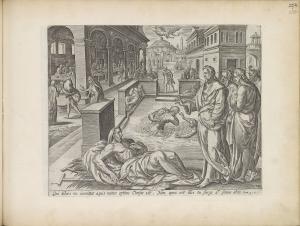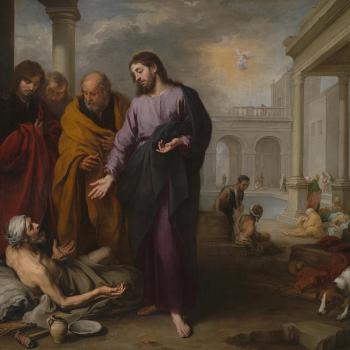
Sin is destructive; it can cause a great amount of pain and sorrow in its wake. It is like a cancer, eating away at the sinner and those around them. The more someone sins, the more it destroys them and their personal integrity. Sin causes people to lose their free agency so that the more someone sins, the more they become trapped or paralyzed by their sins. Sin doesn’t just hurt the sinner. It can and will hurt others. The interdependent relationship of people with each other, indeed, the interdependent nature of the world, means what one person does can and will affect others, so that the more someone sins, the more they condition the world, causing the world and all that is in it to find their full potential hindered. Nonetheless, we often do not perceive the way sin is affecting us, so that we often tend to think we are as free as we have always been, which is why we often continue to sin, going about our actions without realizing how much harm and sorrow we are causing for ourselves and those around us. The more we embrace sin, the more it limits our ability to perceive what it is doing to us, and the more it does that, the more our free agency is diminished. And, if we were to continue to sin, we would find ourselves more and more destroyed by it, until, at last, if it were left unimpeded, it would leave us utterly destroyed. For the nature of sin is to destroy the host. However, sin is not in charge; its time is limited, and it will never be able to achieve its final goal, for Christ is risen, and those in the graves can be and are granted spiritual life.
And yet, we still find ourselves often manipulated by sin. It infects us. It deprives us of our full intellectual ability. It limits our perception and our ability to reason out the full consequences of our actions. Thankfully, we are not in the world alone. We are not without help or aid. Christ came into the world to bring it the light of grace, and with it, to bring us the insight we need in order to overcome the powers of darkness, to find ourselves freed from the paralysis of sin. In the Byzantine tradition, ever year after the celebration of Pascha, there is a reminder of the way Christ comes to heal us from our spiritual paralysis by commemorating and remembering the story of a paralytic man whom Christ healed. His story is recounted, in part, to remind us of the wondrous miracles attributed to Christ, but also to serve as a spiritual lesson, that is, the man is understood as an allegory representing humanity as a whole. His healing represents the way the resurrected Christ restores humanity to its original goodness, giving it the opportunity to arise and make its way with grace to the kingdom of God. Christ grants us freedom, but we are also warned, the freedom needs to be properly engaged, lest, we become lazy and slothful, and find our spiritual muscles once again atrophying, until we once again, find ourselves in a spiritual paralysis. And so, for our healing to fully come into effect, we need to cooperate with grace, that is, we need to take some initiative ourselves, just as the paralytic man had to get up and walk in order to complete his healing:
After this there was a feast of the Jews, and Jesus went up to Jerusalem. Now there is in Jerusalem by the Sheep Gate a pool, in Hebrew called Bethzatha, which has five porticoes. In these lay a multitude of invalids, blind, lame, paralyzed. One man was there, who had been ill for thirty-eight years. When Jesus saw him and knew that he had been lying there a long time, he said to him, “Do you want to be healed?” The sick man answered him, “Sir, I have no man to put me into the pool when the water is troubled, and while I am going another steps down before me.” Jesus said to him, “Rise, take up your pallet, and walk.” And at once the man was healed, and he took up his pallet and walked. Now that day was the sabbath (Jn. 5:1-9 RSV).
Sin does not have to have the final word. We should not let our sins control us, determining what we can and will do in the future. This is one of the reasons why we must not go around judging others, using their past mistakes and sins as excuses to hold them back. While there are all kinds of disciplines which can be used, when properly engaged, we must not let them get in the way of grace. Legalism suggests that the solution to sin is to be found in the making of all kinds of rules which people need to follow, but by thinking in this way, legalism shows it does not understand grace for it is grace, and not the rules, which is at the heart of all spiritual healing. We need grace. Anything and anyone which unjustly stands in the way of the grace must be rejected. In the story with the paralytic man, we find those who tried to embrace the sabbath with a legalistic piety got in the way of the paralytic man: they tried to condemn him for his embrace of grace and the healing it brought him as they said by getting up and walking, he was breaking the sabbath. Now, we must not believe everyone thought or believed that. While there were some who took sabbath rules to that extreme, it is clear many others did not, that they understood that the sabbath and its rules were meant to help humanity and dispensations from those rules were valid when given a legitimate reason for them. Thus, though we read some tried to condemn Jesus for healing on the sabbath, we must not understand that condemnation as indicating it was a common approach that the Jews held, leading us to an antisemitic reading of the text. Rather, we should read it as indicating how a few who wanted to hold onto positions of power and authority saw Jesus as a rival and so tried to use and abuse the sabbath as an excuse to criticize Jesus, whom they feared:
So the Jews said to the man who was cured, “It is the sabbath, it is not lawful for you to carry your pallet.” But he answered them, “The man who healed me said to me, `Take up your pallet, and walk.'” They asked him, “Who is the man who said to you, `Take up your pallet, and walk’?” Now the man who had been healed did not know who it was, for Jesus had withdrawn, as there was a crowd in the place. Afterward, Jesus found him in the temple, and said to him, “See, you are well! Sin no more, that nothing worse befall you.” The man went away and told the Jews that it was Jesus who had healed him. (Jn. 5:10-15 RSV).
If we look at this within the modern Catholic context, and the debate which is had as to who is or is not worthy to receive communion, the way some people today impede or discourage others from receiving communion is similar to the way some wanted the paralytic not to get up and walk. In both instances, we find there is an impediment to grace involved. In regards the modern situation, there is a false notion of worthiness being used to hinder the reception of the eucharist and the healing grace it brings. While not everyone should receive communion, the reasons involved should not be seen as connected to concerns of something which we earn by our actions, for doing so ignores what communion is and why we partake of it. In one sense, because of the transcendent glory involved with the mystery of communion, no one is worthy of it: it is a great gift, one whose benefits transcend us and so can never be earned. On the other hand, it is in and through the gift itself, through the grace in communion, we can be said to be made worthy of communion, because we become what we eat; thus, our worthiness is ultimately found by participation in communion and not from ourselves or what we do. The Byzantine prayer which is traditionally said before communion highlights how we are made worthy for communion through grace:
O Lord, I also believe and profess that this, which I am about to receive, is truly your most precious body and your life-giving blood, which, I pray, make me worthy to receive for the remission of all my sins and for life everlasting. Amen.
We receive the eucharist for the remission of our sins, and then, for the deifying grace which comes from it. If worthiness is found in and through grace, in being cleansed from sins, since the eucharist is for the forgiveness of sins, we find that grace is received in communion. This is why, when we partake of communion, we can be made worthy by the very reception of communion, if, of course, we accept it in the right spirit, that is, in and with faith, hope and love. Now, this is not to say there are not legitimate reasons to have some people not receive communion, but those reasons are not the ones which are brought up when people seek to deny “sinners” communion. What such people are doing is judging and condemning others in a way which they should not be doing, risking their own condemnation, as they receive the eucharist, not in the spirit of communion and love, but in judgment. As they think it is all about how worthy one has made oneself to be, they also show that they do not think they need its grace when they partake of it, for they show they think they are worthy. In this fashion, it is possible they deny themselves the grace contained in it, the grace which they and everyone else needs. Then, they would be the ones taking communion in the wrong spirit, and the judgment and condemnation they would place upon others would fall back on themselves. Thus, when someone thinks worthiness for communion is established by what we do, they risk denying the grace they need for such worthiness, making it possible for them to be the ones who partake unworthily, as Abba Theonan explained:
Yet we should not keep away from the Lord’s communion because we know that we are sinners, but we should hasten to it all the more avidly for the sake of our soul’s healing and our spirit’s purification, yet with that humility of mind and faith that will cause us, while judging ourselves unworthy to receive such a grace, to seek it instead as medicine for our wounds. Otherwise communion may not be worthily received even once a year, as is the case with some who live in monasteries and who are so in awe of the dignity and holiness and worthy of the heavenly sacraments that they think that no one should receive them but the holy and stainless, rather than that it is they that make us holy and pure by receiving them. These people are guilty of a more arrogant presumption than they seem to themselves to avoid, because they judge themselves worthy of receiving them when they do receive them. But it is much more righteous for us to receive the sacred mysteries every Sunday as a remedy for our sickness, and to do so with that humility of heart by which we believe and confess that we can never approach them because of our own deserts, than to be puffed up with a foolish attitude of heart to believe that we are worthy to participate in them even once a year. [1]
So many treat others poorly, making rules to control and dominate them, hindering their reception of grace. We see this was done with the paralytic man, even as it often done in and with communion. The two, of course, go together, as the paralytic man spiritually represents all of us. We are all called to get up and act, that is, to join ourselves to and cooperate with grace. We are called to communion, even if we are sinners. We need spiritual medicine if we are to recover from our spiritual paralysis. Let us, therefore, not be afraid; let us partake, not because we think we are worthy, but because we know we are not and that we need it if we are ever to become worthy. Let us, therefore not become paralyzed with fear, letting others unjustly dictate to us what they have no right to dictate. Let us partake, fully recognizing we are sinners needing help, realizing while we might not be worthy, as long as we also continue to struggle, through grace, we can be made worthy, and eventually with that grace, we will find we will fulfill the expectations of love and truly go and sin no more, if not in our temporal life, then in eternity.
[1] John Cassian, The Conferences. Trans. Boniface Ramsey, OP (New York: Newman Press, 1997), 812-13 [Twenty-Third Conference; Abba Theonas].
Stay in touch! Like A Little Bit of Nothing on Facebook.
If you liked what you read, please consider sharing it with your friends and family!
N.B.: While I read comments to moderate them, I rarely respond to them. If I don’t respond to your comment directly, don’t assume I am unthankful for it. I appreciate it. But I want readers to feel free to ask questions, and hopefully, dialogue with each other. I have shared what I wanted to say, though some responses will get a brief reply by me, or, if I find it interesting and something I can engage fully, as the foundation for another post. I have had many posts inspired or improved upon thanks to my readers.













